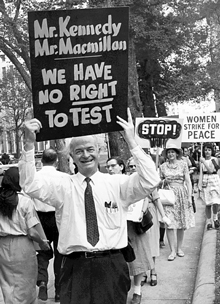
Activism
Pauling only really became politically active after the second world war after seeing the devastation caused by Hiroshima and Nagasaki. It was these event which made him realise how dangerous these newly developed Nuclear weapons were. Like many other Scientists who made important contribution during the war effort he had become a recognised public figure and at the same time was financially well off due to royalties from his book. This put him in a very good position to start his campaigns and began by joining the Emergency Committee for Atomic Scientists when invited by Albert Einstien. Being part of the committee involved touring the country giving informative talks rather than making policies. His campaigns were taking place at the time of the cold war when there was great suspicsion of anything that might be communist. Paulings anti-war campaigns were considered by many very left-wing and as a result he had his passport denied. It was only reinstated after public outcry and after the announcement he had won the Nobel prize for chemistry. This did not stop Pauling and in 1958 he and Eva Helen presented a petition to the United Nations with 11 021 signitures of scientists acrros the globe who were against above ground nuclear testing. Finally in 1963 after a decade of campaigns a partial test ban treaty was signed and that same day that it was announced he had won his second Nobel Prize for peace. The Committee stated that "since 1946 (Linus Carl Pauling) has campaigned ceaselessly, not only against the testing of nuclear weapons, not only against the spread of these armaments, not only against their very use, but against all warfare as means of solving international conflicts."

Taken from http://lpi.oregonstate.edu/lpbio/lpbio2.html